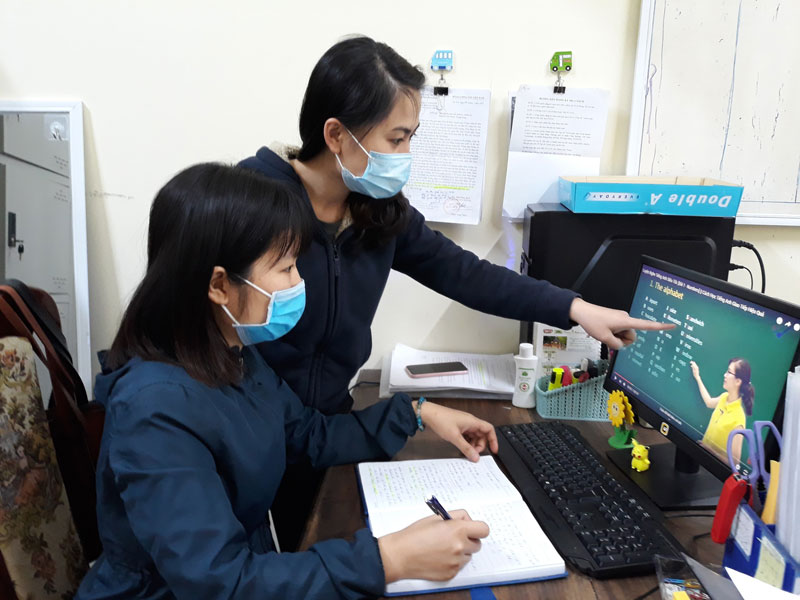
(HBO) – One of the biggest limitations of local public employees is the lack of foreign language proficiency. In the context of global integration, foreign language proficiency has received greater attention from Hoa Binh authorities.
 Public employees in
Lac Son district actively learn English online.
Public employees in
Lac Son district actively learn English online.
With the aim of strengthening training and improving
foreign language proficiency for public employees, the provincial People’s
Committee on January 3, 2020 issued Plan 02 on implementing a national
programme on learning foreign languages during 2019-2030. One of the important
goals of this project is building a professional and high-quality contingent of
public employees who can use foreign languages proficiently at work and work in
international environment.
The
province aims to have 25 percent of local public employees at provincial and
district levels, especially those who hold managerial posts and are under 40
years old, to gain foreign language proficiency at level 4, while 60 percent
and 50 percent of officials holding leadership and management positions
respectively will achieve language proficiency at this level or higher.
The
development of international cooperation and building of a favourable
environment for foreign language learning for public employees have been
carried out in the province over the past time. The locality has stepped up
cooperation with organizations, agencies and units at home and abroad to organize
language training courses, as well as linking with foreign training facilities
and sending employees to courses abroad to improve their professional capacity,
foreign language skills, and working style in international environment./.
The Standing Board of the Hoa Binh provincial Party Committee has agreed in principle on a proposal by the Standing Board of the Party Committee of Hoa Binh city to gather feedback on the city’s 1:2000 zoning plan, which forms part of its broader urban development strategy.
Hoa Binh province has made notable progress in public administration reform and digital government development, with the satisfaction index among citizens and businesses reaching over 84%, according to recent government evaluations.
Thanks to great efforts by local authorities in recent times, the governance and public administration performance of Mai Chau district has been significantly improved.
In the afternoon of June 6, the Party Committee, the People's Council, the People's Committee and the Fatherland Front of Lac Son district solemnly held a meeting to celebrate the 139th anniversary of the district's founding (1886–2025) and the 79th anniversary of the establishment of the district's Party Committee (1946–2025). There was the attendance of Mr. Bui Van Thang, the Vice Chairman of the Provincial People's Council; Mr. Quach Tat Liem, the Vice Chairman of the Provincial People's Committee; Ms. Dang Bich Ngoc, the Deputy Head of the National Assembly Delegation of the province; as well as the former leaders of the province and district through various periods, who are the natives of the district.
Implementing the Politburo’s Resolution No. 57-NQ/TW on breakthroughs in science – technology, innovation, and digital transformation is a golden opportunity for the northern mountainous province of Hoa Binh to renew growth model, improve competitive edge and shorten digital gap.
Resolution 57-NQ/TW, issued by the Politburo on December 22, 2024, identifies sci-tech, innovation, and digital transformation as strategic breakthroughs to build a developed and prosperous nation. In Hoa Binh province, this spirit is not just a slogan, it’s being put into action through concrete initiatives that form a "new development triangle”: digital citizenship, digital economy, and digital administration.



 Public employees in
Lac Son district actively learn English online.
Public employees in
Lac Son district actively learn English online.